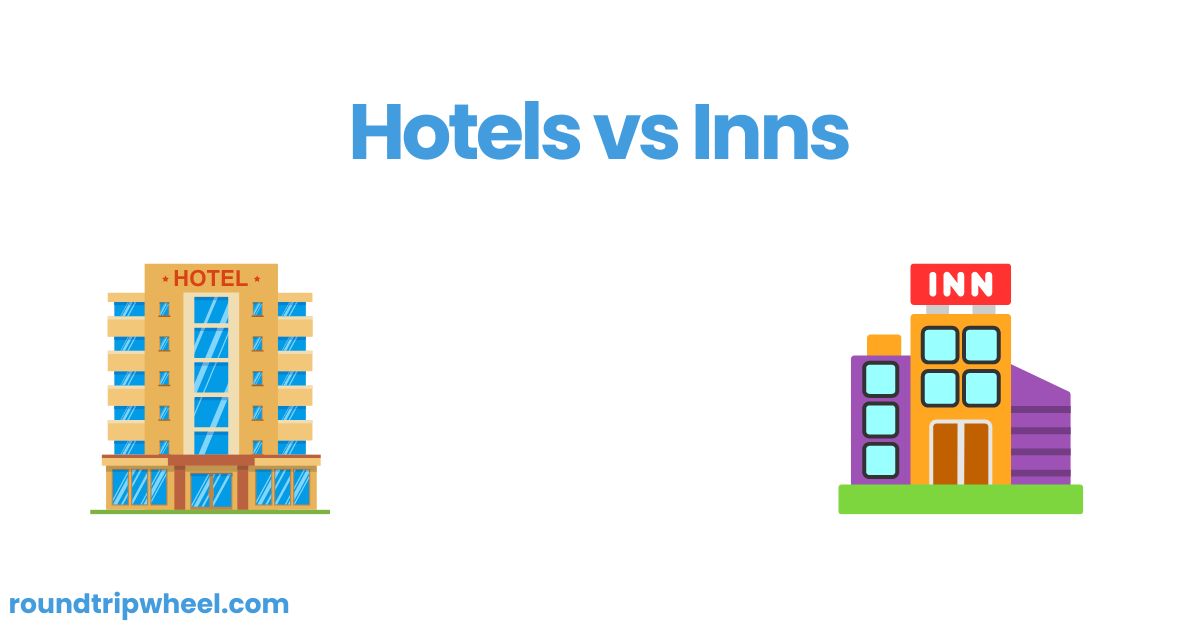Hotels and Inns: Understanding the Key Differences

When it comes to lodging options for travelers, hotels and inns are two establishments that often come into the picture. While both offer accommodation and related services, there are distinct differences between the two that set them apart. In this comprehensive article, we’ll delve into the nuances of hotels and inns, exploring their key characteristics, target audiences, and unique offerings.
I. What is a Hotel?
Hotels are large-scale commercial establishments that cater to a diverse clientele, ranging from business travelers and tourists to families and individuals. These establishments typically offer a wide range of amenities and services to ensure a comfortable and convenient stay for their guests.
Size and Scale
Hotels are generally larger in size compared to inns, with multiple floors and a substantial number of guest rooms. They often feature grand lobbies, multiple dining options, conference and event spaces, fitness centers, and sometimes even shopping arcades within their premises.
Room Types and Amenities
Hotels offer various room types to cater to different preferences and budgets. These can range from standard rooms to luxurious suites, with amenities like flat-screen TVs, minibars, coffee makers, and in-room safes. Many hotels also provide additional services such as room service, concierge services, and laundry facilities.
Facilities and Services
One of the defining characteristics of hotels is the extensive range of facilities and services they offer. These may include:
- Restaurants and bars
- Fitness centers and spas
- Swimming pools
- Business centers
- Banquet and meeting rooms
- Valet parking
- 24-hour front desk and housekeeping services
Target Audience
Hotels cater to a diverse clientele, including business travelers, leisure tourists, families, and groups. They offer a comprehensive range of amenities and services to accommodate the needs of various types of guests.
II. What is an Inn?
Inns are typically smaller, more intimate lodging establishments that offer a unique and personalized experience. They often have a distinct charm and character, reflecting the local culture and traditions of the area in which they are located.
Cozy and Intimate Atmosphere
Inns are known for their cozy and inviting atmosphere, creating a home-away-from-home experience for guests. They often feature unique architectural styles, such as historic buildings or converted homes, adding to their charm and character.
Personalized Service
One of the defining features of inns is the personalized service they provide. With a smaller number of rooms and staff, inn owners and employees can offer a more attentive and tailored experience to their guests, catering to their specific needs and preferences.
Unique Accommodations
Inns often offer unique and distinctive accommodations, ranging from cozy rooms with antique furnishings to charming suites with fireplaces or private balconies. Each room may have its own character and design, reflecting the inn’s overall theme or aesthetic.
Dining Options
Many inns feature on-site dining options, such as restaurants or taverns, offering guests a taste of local cuisine and a chance to socialize with fellow travelers. Some inns may also provide complimentary breakfast or afternoon tea as part of their hospitality.
Target Audience
Inns typically cater to leisure travelers seeking a more intimate and personalized experience. They appeal to couples, small groups, and individuals who value unique accommodations, local charm, and a sense of community during their stay.
III. Key Differences between Hotels and Inns
While hotels and inns share the common goal of providing accommodation and related services, there are several key differences that set them apart:
Size and Scale
Hotels are typically larger in scale, with a substantial number of guest rooms and expansive facilities. Inns, on the other hand, are smaller and more intimate, often with a limited number of rooms and a more focused approach to service.
Amenities and Services
Hotels offer a wide range of amenities and services, such as restaurants, fitness centers, spas, and meeting rooms. Inns, while providing comfortable accommodations and dining options, may have fewer amenities and services compared to hotels.
Atmosphere and Experience
Hotels often have a more corporate or modern atmosphere, catering to a diverse range of guests. Inns, in contrast, strive to create a warm, cozy, and personalized experience, reflecting local charm and character.
Pricing
Generally, hotels tend to be more expensive than inns, especially when it comes to luxury or upscale properties. Inns, with their smaller scale and more personalized service, may offer more affordable rates, making them an attractive option for budget-conscious travelers.
Loyalty Programs
Major hotel chains frequently offer loyalty programs and rewards systems for frequent guests. Inns, being smaller and independently owned, may not have such programs in place, but they often rely on personalized service and unique experiences to foster guest loyalty.
Location
While hotels can be found in urban centers, tourist destinations, and various locations, inns are often situated in more rural or scenic areas, offering guests a chance to immerse themselves in the local surroundings and culture.
IV. Choosing the Right Lodging Option
When it comes to selecting the right lodging option, it ultimately depends on your specific needs, preferences, and travel goals. Here are some factors to consider:
Purpose of Travel
If you’re traveling for business or attending a conference, a hotel with extensive meeting facilities and business amenities may be the better choice. However, if you’re seeking a relaxing getaway or a romantic escape, an inn with its cozy atmosphere and personalized service could be more appealing.
Budget
Hotels, especially luxury or upscale properties, can be more expensive than inns. If you’re on a tighter budget, an inn may offer more affordable rates without compromising on comfort and quality.
Desired Amenities
Consider the amenities and services you require during your stay. If you value having access to a fitness center, spa, or multiple dining options, a hotel may be a better fit. However, if you prioritize a unique and personalized experience, an inn could be the ideal choice.
Location and Surroundings
If you prefer staying in the heart of a city or tourist destination, hotels may be more conveniently located. However, if you’re seeking a more secluded or scenic location, inns in rural or countryside settings could provide the perfect escape.
Ultimately, both hotels and inns offer their own unique advantages and appeal to different types of travelers. By understanding the distinctions between these two lodging options, you can make an informed decision that aligns with your travel preferences and desired experience.

About Author
Hey there, fellow explorers! I’m Mark Rodriguez, a big fan of adventures and always hungry for more. Packed with stories and a trusty camera, I’m on a mission to explore cool places around the world.
I love diving into new cultures and landscapes. As a travel writer, my goal is to get you excited about stepping out of your comfort zone, trying new things, and discovering the awesome magic our world has.
Check out my blog for cool stories, travel ideas, and helpful tips to plan your own amazing getaway!






